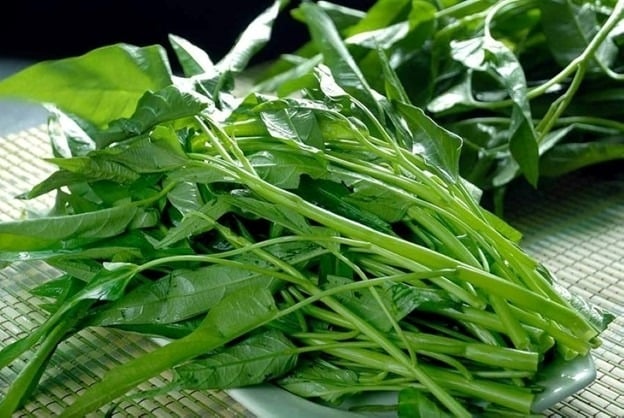3 Common Vegetables Beneficial for High Cholesterol and Diabetes
Water Spinach
Water spinach is a popular summer vegetable in Vietnamese cuisine. Rich in insoluble fiber and phenolic compounds, it has been proven to limit lipid absorption in the small intestine.
A study published in Food & Function revealed that extracts from water spinach (Ipomoea aquatica) effectively reduce triglycerides and LDL-cholesterol in hyperlipidemic mice. Additionally, its high magnesium and potassium content helps regulate blood pressure and improve glucose metabolism.
According to the American Heart Association (AHA), magnesium-rich foods play a crucial role in reducing insulin resistance and metabolic syndrome, key precursors to diabetes and cardiovascular diseases.

Bitter Melon
Bitter melon has long been used in traditional medicine to lower blood sugar, and modern research supports its efficacy.
The Journal of Diabetes and Metabolic Disorders highlights that compounds like charantin and polypeptide-P in bitter melon mimic insulin, significantly reducing fasting and postprandial glucose levels in type 2 diabetes patients. It also enhances insulin sensitivity, reduces oxidative stress, and mitigates inflammation—key risk factors for diabetes and lipid disorders.
Due to its potent hypoglycemic effect, individuals on diabetes medication should limit intake to 100–200g of cooked bitter melon daily and consult healthcare providers before regular consumption.

Garland Chrysanthemum
Garland chrysanthemum, a winter staple, is rich in flavonoids like quercetin and luteolin, which combat inflammation, reduce blood lipids, and protect blood vessels from high glucose damage.
A review in Nutrients indicates that chrysanthemum-family vegetables, especially garland chrysanthemum, lower inflammatory markers such as CRP and TNF-α, directly linked to vascular complications in diabetes.
With a very low glycemic index (GI), garland chrysanthemum minimally impacts post-meal blood sugar, making it ideal for prediabetics and type 2 diabetics. Opt for steaming, boiling, or soups over frying to preserve its health benefits.
Nutritional Advice
-
Those on blood sugar or lipid-lowering medications should consult dietitians to tailor portions and avoid adverse interactions or excessive hypoglycemia.
3 Everyday Vegetables to Lower Blood Fat and Stabilize Blood Sugar Naturally
In the daily meals of Vietnamese people, there are humble yet incredibly beneficial vegetables that offer remarkable health advantages. Research reveals that the following three common greens not only aid in reducing blood fat levels but also help stabilize blood sugar, making them particularly beneficial for individuals with high cholesterol or diabetes.

































